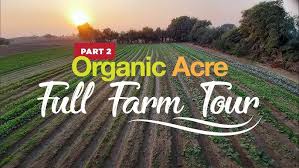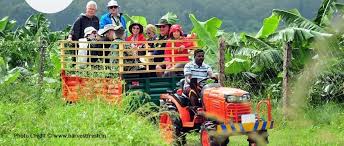
Organic farming and farm tours offer an engaging way to explore sustainable agriculture and understand how organic methods are applied in practice. These tours provide a behind-the-scenes look at organic farms, allowing visitors to see firsthand the techniques used to promote soil health, manage pests naturally, and grow high-quality produce without synthetic chemicals. Participants can learn about key practices such as composting, crop rotation, and the use of natural fertilizers. Farm tours often include interactive elements, like hands-on activities or demonstrations, which deepen visitors’ appreciation for the effort and expertise involved in organic farming. By connecting directly with farmers, tour-goers gain insights into the challenges and rewards of organic agriculture, fostering a greater awareness of the environmental and community benefits of supporting sustainable farming practices.

Another key aspect of organic farming and farm tours is the opportunity to learn about the broader impact of organic farming practices on the environment and community. Organic farms often incorporate practices that support biodiversity, such as planting cover crops and maintaining natural habitats. During farm tours, visitors can see how these practices contribute to a healthier ecosystem and promote wildlife conservation. Furthermore, many organic farms engage in community outreach and education, providing visitors with information on how to adopt sustainable practices in their own lives. Organic farming and farm tours thus serve as a platform for raising awareness about environmental stewardship and fostering a sense of community among those interested in sustainable agriculture.
Farm tours also provide a venue for direct interaction with organic farmers, who can share their personal stories, challenges, and successes. This personal connection helps humanize the farming process and allows visitors to ask questions and engage in meaningful conversations about organic farming. By hearing firsthand accounts from those who practice organic farming, participants gain a more nuanced understanding of the dedication and expertise required to manage an organic farm successfully.
Farm tours also provide a venue for direct interaction with organic farmers, who can share their personal stories, challenges, and successes. This personal connection helps humanize the farming process and allows visitors to ask questions and engage in meaningful conversations about organic farming. By hearing firsthand accounts from those who practice organic farming, participants gain a more nuanced understanding of the dedication and expertise required to manage an organic farm successfully.
Another key aspect of organic farming and farm tours is the opportunity to learn about the broader impact of organic farming practices on the environment and community. Organic farms often incorporate practices that support biodiversity, such as planting cover crops and maintaining natural habitats. During farm tours, visitors can see how these practices contribute to a healthier ecosystem and promote wildlife conservation. Furthermore, many organic farms engage in community outreach and education, providing visitors with information on how to adopt sustainable practices in their own lives.
Organic farming and farm tours thus serve as a platform for raising awareness about environmental stewardship and fostering a sense of community among those interested in sustainable agriculture.
Such interactions provide a tangible connection to the farming process and deepen visitors’ understanding of how their food is produced. This experiential learning approach fosters a greater appreciation for the labor and dedication involved in organic farming and reinforces the value of supporting sustainable agriculture.









